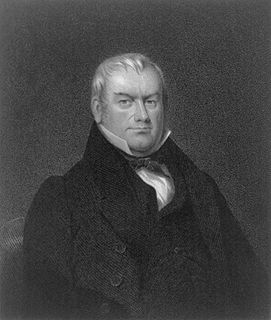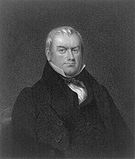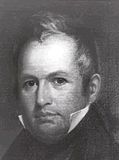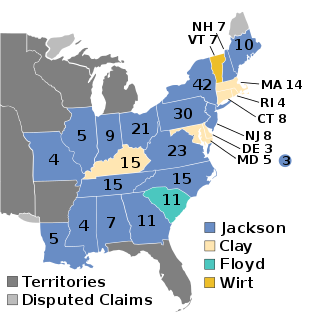
The 1832 United States presidential election was the 12th quadrennial presidential election, held from Friday, November 2, to Wednesday, December 5, 1832. It saw incumbent President Andrew Jackson, candidate of the Democratic Party, defeat Henry Clay, candidate of the National Republican Party.
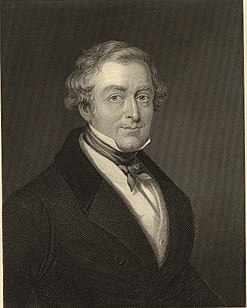
In the 1841 United Kingdom general election, there was a big swing as Sir Robert Peel's Conservatives took control of the House of Commons. Melbourne's Whigs had seen their support in the Commons erode over the previous years. Whilst Melbourne enjoyed the firm support of the young Queen Victoria, his ministry had seen increasing defeats in the Commons, culminating in the defeat of the government's budget in May 1841 by 36 votes, and by 1 vote in a 4 June 1841 vote of no confidence put forward by Peel. The Whigs and Tories were at odds over whether Melbourne's defeat required his resignation, with the Queen being advised by Lord Brougham that calling an election would be without precedent, and that it should only be dissolved to strengthen the government's hands, whereas dissolution facing the Whigs in 1841 was expected to result in their defeat. Melbourne himself opposed dissolution, although his cabinet came to accept it, and Melbourne requested the Queen dissolve Parliament, leading to an election.

Events from the year 1832 in Canada.

George Lemuel Woods was an American lawyer, judge, and politician. A member of the Republican Party, Woods served as the third Governor of Oregon from 1866–1870. Failing to win renomination, Woods was then appointed Territorial Governor of Utah by President Ulysses S. Grant, serving in that position from 1871–1875.

The Parliament of Western Australia is the bicameral legislature of the Australian state of Western Australia, forming the legislative branch of the Government of Western Australia. The parliament consists of a lower house, the Legislative Assembly, an upper house, the Legislative Council and the Queen, represented by the Governor of Western Australia. The two Houses of Parliament sit in Parliament House in the state capital, Perth.

William Lee Davidson Ewing was a politician from Illinois who served partial terms as the fifth governor of the state and as U.S. Senator.

Peter Dumont Vroom, an American Democratic Party politician, served as the ninth Governor of New Jersey and as a member of the United States House of Representatives for a single term, from 1839–1841.

Western Australia was a crown colony from its establishment in 1829 as the Swan River Colony until the advent of representative government in 1870. During this time executive and legislative power was vested in the Governor of Western Australia, but from 1832 he had Executive and Legislative Councils to assist and advise him. The Western Australian Legislative Council met for the first time on 7 February 1832. This is a list of Members of the Western Australian Legislative Council between 1832 and 1870.

Alexandre Mouton was a United States Senator and the 11th Governor of Louisiana.

The 1832 New York gubernatorial election was held from November 5 to 7, 1832, to elect the Governor and Lieutenant Governor of New York.
The 1833 United States Senate special election in New York was held on January 4, 1833, by the New York State Legislature to elect a U.S. Senator to represent the State of New York in the United States Senate.
The 1833 United States Senate election in New York was held on February 5, 1833, by the New York State Legislature to elect a U.S. Senator to represent the State of New York in the United States Senate.
The United States Senate elections of 1832 and 1833 were elections that had the Anti-Jackson coalition assume control of the United States Senate from the Jacksonian coalition, despite Andrew Jackson's victory in the presidential election.
"As Maine goes, so goes the nation" is a phrase that at one time was in wide currency in United States politics. The phrase described Maine's reputation as a bellwether state for presidential elections. Specifically, Maine's September election of a governor predicted the party outcome of the November presidential election in 19 out of the 26 presidential election years from 1832 to 1932, or 73 percent of the time. The accurate years were from 1832 through 1844, in 1852, from 1860 through 1876, in 1888, from 1896 through 1908 and from 1920 through 1932.
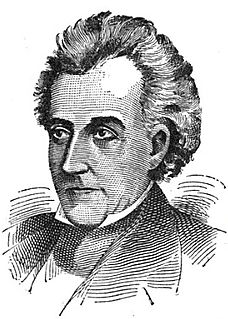
The Missouri gubernatorial election of 1832 was Missouri's fifth gubernatorial election. The election was held on August 6, 1832. Lt. Governor Daniel Dunklin, the Jacksonian candidate was elected over John Bull, the Anti-Jacksonian candidate.

The Missouri gubernatorial election of 1836 was Missouri's sixth gubernatorial election. The election was held on August 1, 1832. Sitting Lt. Governor Lilburn Boggs, was elected over sitting Congressman William Henry Ashley.
The Argyllshire by-election of 1878 was fought on 27 August 1878. The byelection was fought due to the resignation of the incumbent Liberal Member of Parliament, the Marquess of Lorne to become Governor General of Canada. It was retained by Lorne's brother the Liberal candidate Lord Colin Campbell.
The members of the 1st General Assembly of Newfoundland were elected in the Newfoundland general election held in November 1832, the first general election for the colony. The general assembly sat from January 1, 1833 until 1836.

The 1936 United States presidential election in Virginia took place on November 3, 1936. Voters chose eleven representatives, or electors to the Electoral College, who voted for president and vice president.
